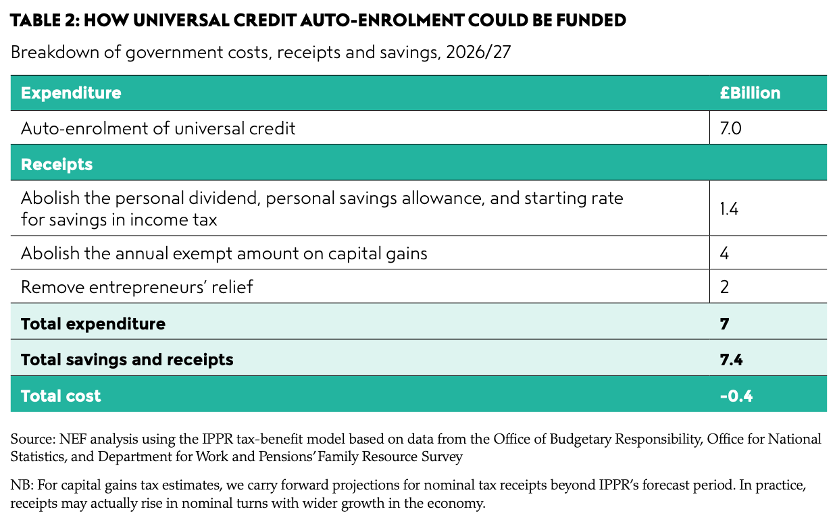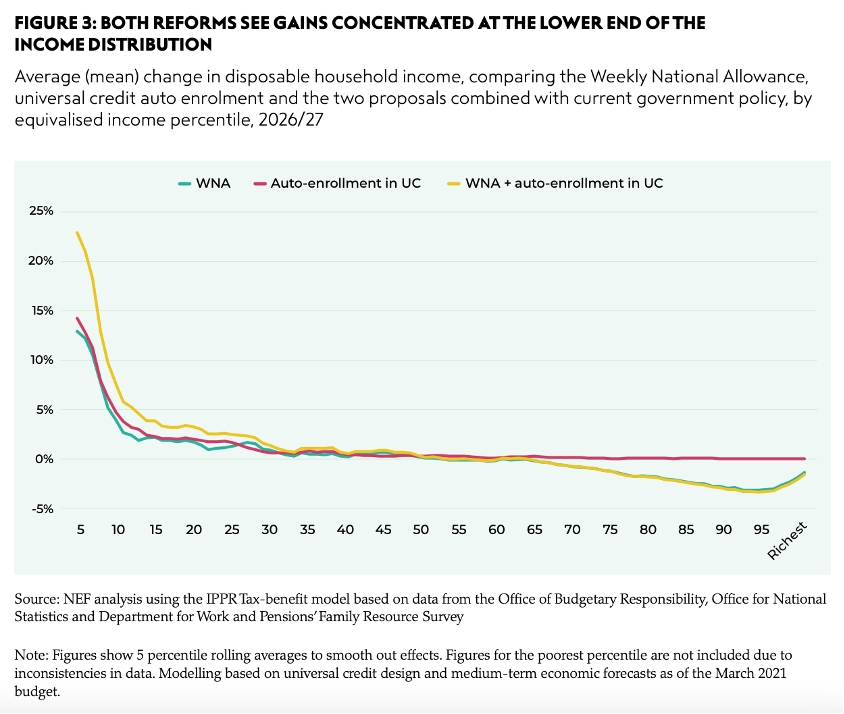1.3 million people eligible for universal credit missing out on payments worth £7,300 per year
Making UC payments automatic like the tax system would lift 380,000 people out of poverty this year
28 January 2022
New modelling shows that making universal credit (UC) payments automatic for those eligible would boost annual incomes for 390,000 families by £7,300 on average, effecting 1.3 million people this year. Moving everyone onto the UC system on a similar basis to how people are required to register for tax would lift 380,000 people out of poverty, including 140,000 children, according to new research from the New Economics Foundation (NEF) published today.
Hundreds of thousands of people are pushed into hardship unnecessarily every year because they do not receive the income support they are entitled to. This is driven by factors such as a lack of access to information and support navigating government systems, public stigmatisation of benefit recipients and the administrative difficulties associated with a successful application for UC.
NEF modelling shows that once UC is fully rolled out by 2026/27, the number of families missing out on payments they are entitled to will rise to 660,000, or 2.3 million people, worth an average of £7,400 per family per year. Among the poorest 10% of families it is estimated that 1 million people will live in families missing out on payments worth £10,000 per year on average.
Recent reforms to UC announced at the October 2021 budget – including a lower taper rate and higher work allowances – worsen this problem as many are unaware that they are newly entitled to a UC payment. The taper rate sets the rate at which UC payments are withdrawn for every £1 of earnings, and the work allowances set the level of earnings above which the taper rate applies. Following the October reforms, a further 150,000 people will be living in working families that are missing out on UC payments they are entitled to, and this number will rise to 300,000 by the time UC is fully rolled out.
The report recommends auto-enrolling everyone in the UK onto the UC system so that new payments start to be processed automatically as soon as anyone becomes eligible. This would mark a first step towards a Living Income for the UK, a new social security system that will guarantee everyone the minimum income they need to meet the challenges and opportunities of a fast-changing economy.
The report makes a number of recommendations to eventually move everyone onto the UC system, transforming the benefit into a stronger minimum income guarantee, including:
- Keeping existing UC accounts open permanently after the claim is over: Just as someone’s Personal Tax Account with HMRC doesn’t close because of a period of no earnings, UC accounts should sit dormant when people are earning above the threshold for payments, but remain on the system ready for a new claim should someone’s earnings fall.
- Creating a basic UC profile for everyone with information from HMRC: This would increase the speed of financial support being provided and facilitate subsequent proposals to move towards greater automation of claims for UC.
- · Using HMRC data to flag when someone’s earnings have dropped: Rather than relying on individuals to self-report when their earnings have fallen to a level that might entitle them to support from UC.
- · Providing better support and integration for self-employed people: It would be onerous to require self-employed people to report their earnings every month to monitor whether they might be entitled to UC but measures could be introduced to encourage and support individuals to do so.
- · Reconciling the tax and benefit systems to allow more auto-enrolment: Taxes are assessed on an individual basis, whereas UC is assessed on a household basis. Assessing taxes and benefits on a common basis would mean the information needed to auto enrol somebody onto UC would be more readily available.
- Removing conditionality and sanctions from UC: The best route to encourage people into employment is through the provision of high-quality, personalised support, built around trusting relationships, alongside fostering an economy that offers well-paid, good quality jobs for all.
NEF modelling shows that a more automated system that ensures everyone receives the payments they are entitled to would cost an additional £7 billion once UC is fully rolled out in 2026/27. NEF proposes this should be funded by rebalancing the share of tax towards income from wealth. We recommend effectively abolishing both the annual exempt amount in capital gains tax and the so called ‘entrepreneurs relief in in capital gains, raising a combined £6 billion a year. Effectively abolishing the tax-free allowances in income tax on personal savings and dividends would raise a further £1.4 billion a year.
New NEF modelling also shows how a system of auto enrolment could be combined with a NEF’s past proposal for reforming the personal allowance of income tax into a new Weekly National Allowance. Together, the two policies would represent important progress towards a Living Income, introducing key advantages from both a Universal Basic Income (UBI) and a Minimum Income Guarantee (MIG). The combined reforms would boost incomes for the poorest 10% of families by £2,000 per year on average by 2026/27, lifting 760,000 families out of poverty.
Tom Pollard, independent policy expert and co-author of the report, said:
“With rising prices, job losses from a new wave of coronavirus, higher interest rates and a national insurance hike, we’re set to see a fast deterioration in UK living standards in 2022. And still, the government is failing to support families that need it most.
“Part of the problem is that when factors such as higher energy bills cause a cost of living crisis, it is hard for government to reach the right people quickly. This is an example of a problem that auto-enrolment on UC would help solve, ensuring that everyone who is eligible for support is getting it so that they are better able to withstand these hits to their income.”
Dominic Caddick, Assistant Researcher at the New Economics Foundation, said
“NEF is calling for a Living Income, a bold new way of doing income support that would set an income floor below which no one can fall. Achieving this mean ensuring that work pays well, but also that the social security system supports those that are not able to work or cannot earn a living income from the work they do.
“Our new report looks at how we can provide a Living Income for all by ensuring more people have financial support when they need it and giving everyone the assurance that additional support will be provided when they are struggling.”
Contact
Becky Malone, becky.malone@neweconomics.org, 07925950654
Notes to editors
The New Economics Foundation is a charitable think tank. We are wholly independent of political parties and committed to being transparent about how we are funded.
The full report is available at https://neweconomics.org/2022/01/social-security-for-all
The analysis was completed by NEF economists using the IPPR tax and benefit microsimulation model. The model uses data from the Family Resources Survey (FRS) – a dedicated survey for tax and benefit microsimulation modelling commissioned by DWP – and combines this with the latest forecasts for key economic aggregates like interest rates, average earnings and inflation. The model works by simulating new scenarios for the UK labour market, earned and unearned income, tax and social security. The model estimates the impacts of policy changes, including a breakdown of fiscal effects (changes to government expenditure and receipts), distributional impacts across family incomes and the implications for various measures of inequality and poverty.


Topics Social security






